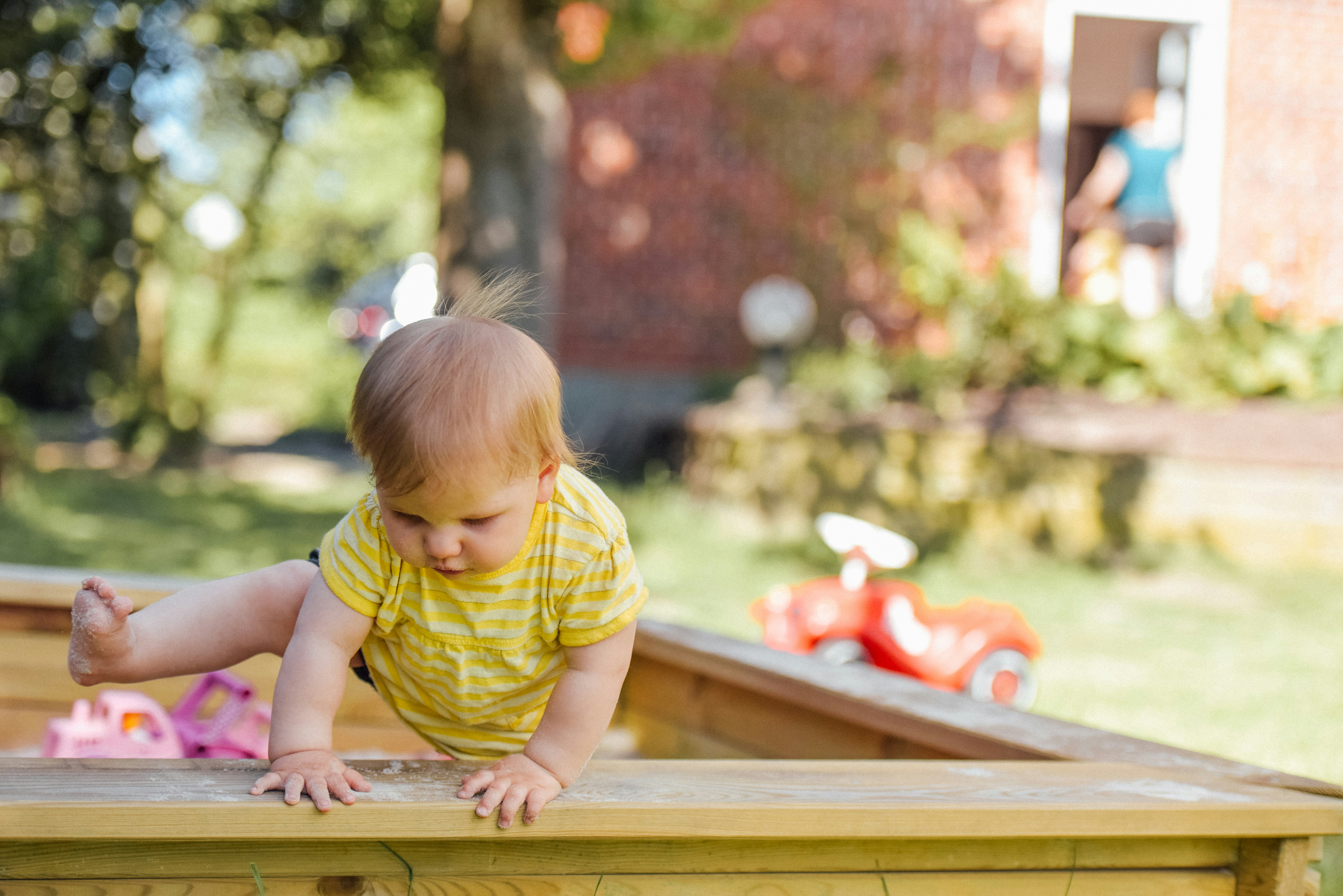First Steps: When Do Babies Start Walking?

Becoming a parent is a thrilling and transformational experience. The most anticipated milestone is witnessing babies take their first steps because it shows that your baby is getting ready to become independent and curious. It’s a fun, but nerve-wracking moment as you watch your wobbly little one take his or her first moves on two feet.
As a new parent or expectant parent, it’s understandable that you find yourself researching: When do babies start walking, and how can I aid the process? And that’s why we’re coming to you with answers!
In this article, we provide a step-by-step guide to answering the question of when babies start walking and explore how you, as a parent, can help them properly learn to walk.
What age do babies walk?
The journey from a curious newborn to an adventurous toddler taking their first steps is a magical one filled with plenty of adorable wobbles. But amidst the excitement of having a tiny baby, one question often lingers: "What age do babies walk?"
The answer is not so simple. While the average age for taking first steps is between 12 and 18 months, some may do it earlier, while others may take their time until after 20 months.
Babies mastering the art of sitting up begins with "tummy time," which is laying them on their stomachs for brief periods while they're awake. Placing your baby on their tummy encourages them to lift their head, thereby strengthening the neck and promoting coordination. Paediatricians recommend that by 2 months of age, babies should be getting 15 to 30 minutes of total tummy time daily.
The early stages
Babies generally have flat feet because they are born with a pad of fat, even in the arch area. Also, their leg and foot muscles aren't developed enough to support their arches when they first begin to stand, and it’s only between ages six and nine months that this hardens into bone.
At this stage, you should support foot development and keep your baby comfortable with specialised newborn baby shoes such as those made of soft leather. Because babies’ feet grow pretty quickly, it’s very important to keep checking that these fit.
Cruising to walking
Babies will generally master the art of standing while holding onto something and graduate to cruising before actually walking. Cruising is when the baby walks in little steps while holding onto something for assistance.
During this stage, tight or badly fitting shoes can put pressure on the child, causing developmental issues or problems in the future. This is why it’s important to choose pre-walker shoes to assist and protect their feet while they move around.
Your child's first few steps may be wobbly and may not make it very far. However, most toddlers progress from taking a few steps to walking after a few days.
It’s important to remember that the age at which babies start walking differs from one baby to another. While some kids start walking around their first birthday, others can begin taking unassisted steps as early as 9 months or as late as 20 months.
Factors that influence walking
Several factors can influence a baby's walking ability, including genetics, muscle strength, balance, temperament, and size. Infants' leg length, balance, and strength in drop-off height can all influence their walking abilities as well. Build and temperament play parts, too.
A high-energy baby will probably strut his or her stuff sooner than a happy-to-sit baby. Furthermore, some kids are more cautious and only want to take a step when they’re positive they won’t tumble; others are daredevils and will dive right in. Having older siblings may give babies a running start when it comes to walking. Witnessing their siblings effortlessly traverse the house can ignite a playful competition, motivating them to mimic the movements and conquer their own first steps.
How can parents encourage walking?
During infant development, every roll, sit, crawl, and stand of a baby is a triumph worth celebrating. Here are some ways parents can encourage their babies to walk:
- Interactive play during sitting: While they are sitting unassisted for 4–7 months, you can roll a ball back and forth or play stacking games to help enhance their little muscles. Sitting unassisted is the first exciting step in mobility that will help your precious baby strengthen the muscles they will need when it comes time to learn how to stand.
- While your little explorer gets the hang of standing and walking, ditch the hand-holding and support their core instead. Imagine their ribs as a magical stabilisation zone, perfect for helping them keep their balance and build strong walking muscles. Remember, tumbles are part of the fun.
- Turn tiny hands into stepping stones! To entice your little one to take solo steps, let them clutch a small treasure. It could be a cute rattle, a cuddly friend, or their favourite toy—anything they just can't bear to drop! Their focus on the prize might just pave the way for independent walking adventures.
- Pull them up often. As your baby grows stronger, you will often catch them pulling themselves up during the first 8 months. Once you notice this, add this to their routine. Help your baby to pull themselves up, then show them how to bend their knees to get back down to the floor. This will help reduce those early falls we all know too well when they start taking steps on their own.
- During 8–9 months, practice walking with your baby. The more your baby gets used to standing and being on their feet, the more likely they will feel comfortable taking those first few steps.
- Play "steady as a rock!" Sit on the floor with your little one and help them stand up tall. See how long they can be balancing champions before a gentle plop! Remember to cheer them on each time they try, no matter how long they last.
- Once your baby takes their first step, show them it’s a big deal, encourage them by clapping and cheering, and encourage them to take more steps.
- Choose the right shoes! Our range of toddler shoes here at Inch Blue are designed to replicate the benefits of barefoot walking to allow your child’s foot to develop naturally and outside of restrictive footwear.
When to seek professional advice
If your baby is aged 18 months or older and hasn't started walking yet, you should consult a paediatrician. Likewise, if you notice your child stumbling to one side or their legs appearing weak. Seeking expert assistance will help you address any potential issues and keep your child on track with their development.
When do babies start walking? A summary
Babies typically start walking between the ages of 9 and 18 months, with most taking their first unaided steps around 12 months. Learning to walk involves a sequence of milestones, such as standing, cruising, and eventually walking.
It’s critical to establish a safe and engaging atmosphere to encourage babies to walk and equally important to find the right pair of shoes to support them.
Inch Blue has shoes that meet every key criteria and support every stage of a baby’s development. Browse our adorable collections or get in touch if you need additional support.
